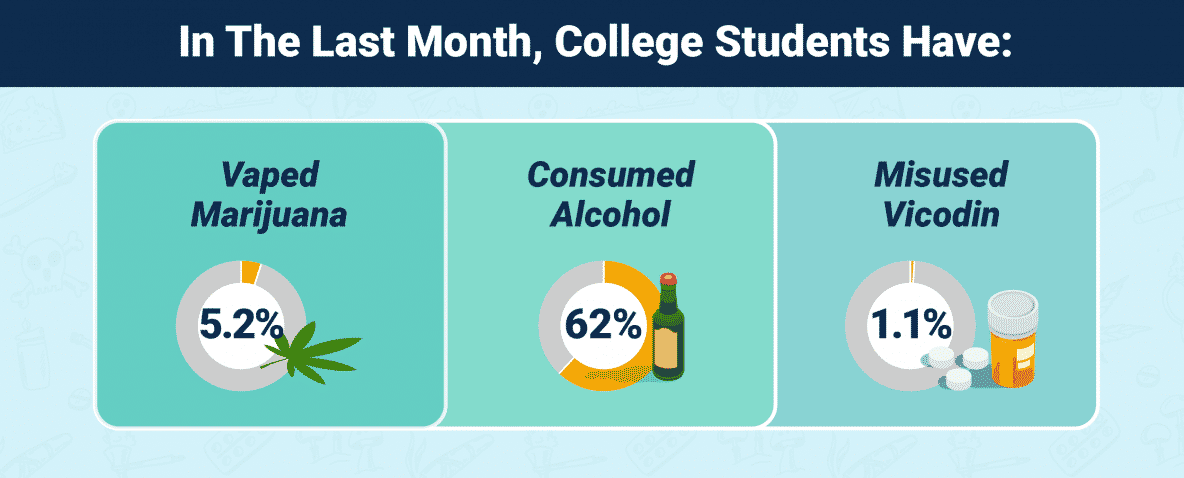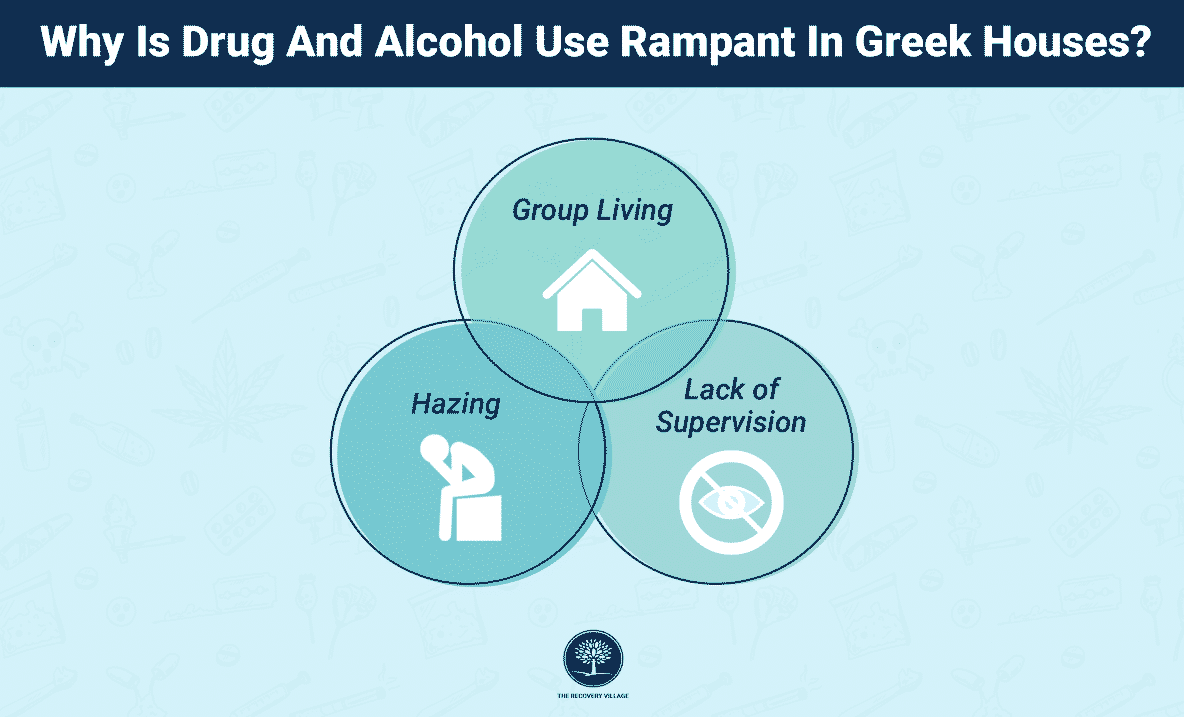Before you consider joining a fraternity or sorority, learn more about drug and alcohol use among collegiate Greek life organizations.
Movies and TV shows always seem to portraycollege Greek lifeas continuous parties full ofbinge drinking, drug use and promiscuity. This media shows less education and more partying, especially when Greek fraternities or sororities are involved.
Alcohol anddrug use in collegeis a reality, and when people envision Greek life, they often think of big parties and lots of substance use. According to2017 datafrom the National Institute on drug abuse, 62% of college students consumed alcohol in the past month. In addition, 5.2% vapedmarijuanaand 1.1% misusedVicodinin the past month. Many people who misuse substances at this age suffer from substance use disorders later in life.
College drinkingis a significant problem, but why doGreek communitiesreceive so much of the blame? The answer lies in the types of situations involved in fraternity or sorority life.

Substance Abuse in Greek Organizations
Fraternities and sororities cultivate positive communities ofcollege studentswho engage in philanthropic efforts and networking activities. However, over the past few decades,Greek letter organizationshave gained notoriety for wild parties and dangerous hazing rituals.
Treatment Can Be Life Changing. Reach out today.
Whether you are struggling with addiction, mental health or both, our expert team is here to guide you every step of the way. Don’t wait— reach out today to take the first step toward taking control of your life.
One studyestablished five factorsthat are consistently associated withalcohol use in the Greek system.The reasons fordrug abuse in Greek lifemay be related:
- Members who drank alcohol heavily inhigh schooland continued into college usually join aGreek letter organization
- Members seek environments where heavy drinking occurred
- Alcohol use is common amongGreek organizationsand is involved in hazing and initiation rituals
- Members tend to overestimate the drinking habits of their fellow brothers or sisters
- The fraternity or sorority house provides an environment to use alcohol heavily
Researchers question whether students joinfraternities and sororities to partyor if these students were already drinking alcohol and using drugs, giving Greek life a reputation of partying and dangerous substance use.
Greek Life Substance Abuse Statistics
Hazing rituals and parties cause an increased risk of injuries and death, prompting researchers to examine the relationship betweenGreek housingand substance use. Researchers found that young men face ahigher riskof binge drinking than women and have a higher chance of engaging in dangerous behaviors due topeer pressure.
However, alcohol consumption is still high among men and women in Greek organizations,regardlessof whether alcohol is allowed in the house. Substance use in an individual’s college years can have long-term effects, such as the development of substance use disorders in the future.
Data aboutlong-term effectsshows that among Greek life members:
- Almost half of fraternity members have symptoms of alcohol addiction in young adulthood
- Approximately26%of women who lived in a sorority house developed alcohol addiction symptoms by age 35
- Compared to non-Greek life members, those who joined a fraternity or sorority weresignificantly more likelyto use marijuana in their mid-30s
Data from a 10-yearstudyaboutGreek life alcohol and drinking statisticsrevealed that:
- Of a national fraternity of 3,400 members, 97% drank alcohol regularly and 64% identified as binge drinkers
- 60% of fraternity members started drinking at age 16
Statistics fromother surveysshow the direct effects of substance use in Greek organizations. Each year:
- Around 500,000 members suffer unintentional injuries related to substance use
- 70,000 cases of sexual assault and acquaintance rape
- 1,400 members die from alcohol-related causes
- 600,000 assaults occur
- 50% of members perform poorly on important school assignments

Why Is Drug and Alcohol Use Rampant in Greek Houses?
Substance abuse in college studentsis already prevalent, but a significant percentage of students drink alcohol and use drugsmore frequentlythan other age groups. However, why do more members ofGreek housesembrace adrinking culturecompared to other students?
Researchers believe a few factors contribute to the high levels of substance use in Greek organizations, including:
- Group living
- Hazing
- Lack of supervision
Group Living
For some members, peers at asorority or fraternity housemay serve as a family away from home — or the only family some students have.Peer pressure among college studentsis already high, and the increased pressure in Greek organizations may be a large factor in why members use substances in such high amounts.
Drinking heavily and binge drinking are also norms in Greek life, so members are expected to keep up with their brothers and sisters. New members especially may feel an overwhelming desire and pressure to fit in with the rest of the fraternity or sorority.
Hazing
Hazing is an initiation into a new team, group or organization, like a fraternity or sorority. Hazing can range from humiliating pranks to outright abuse and criminal activity. Sometypes of hazing involvephysical, psychological and sexual assault. Because of these possibilities,Greek life hazingrituals are often prohibited by law.
College hazingrituals can cause significant emotional trauma and some have even resulted in severe injury or death, such as the events that took place atPenn State in 2019. Pledges who get hazed are often freshmen and are less likely to have been exposed toheavy drinkingandillicit drug use. When a hazing ritual involves alcohol and drugs, low substance tolerance can have dangerous outcomes.
Lack of Supervision
In most college dorms, aresident assistant(RA) is assigned to each floor to enforce rules and monitor behavior. One of theproblems with Greek lifeis that upperclassmen are usually responsible for supervision of the members living in the house. As a student, it can be challenging to limit the amount of partying that occurs. Sometimes, the head of the house — who is usually the president of the fraternity or sorority — may even encourage excessive drinking.

Staying Sober in College
Various reasons exist for wanting to stay sober during college. While it may seem difficult, especially if someone is part of Greek life,staying sober in collegeis possible. Staying sober doesn’t mean a student has to sit in their dorm binge-watching television shows while their peers drink and have fun. Students who are inrecoverycan still attend parties and social events.
If a student isn’t comfortable being around the party scene, they can throw sober parties, explore the town, dine out with friends or experience the arts.
These articles can help students stay strong in sobriety during college:
- 5 Sober Tips for Students in Recovery
- College 101: How to Have Sober Fun in College
- How to Party Sober in 5 Easy Steps
- Sobriety in Social Circles: How to Answer When Friends Ask Why You’re Sober
Sober Fraternities
If a student wants to be part of a Greek organization but isn’t comfortable being surrounded by alcohol, there aresober fraternitiesand sororities that they can join to gain the benefits of community and networking.
One of the most well-known sober fraternities and sororities isAlpha 180. This fraternity offers similar philanthropic, networking and career-driven opportunities as traditional fraternities and sororities forstudents in recoveryor students committed to sobriety.
Collegiate Recovery Communities
In addition to sober fraternities, there are programs and groups calledcollegiate recovery communities(CRC).Collegiate recovery programsoffer students inaddiction recoveryan opportunity to thrive in college and have fun without drugs or alcohol. These programs often offersober living communitiesfor students, so those in recovery will not have to live with people who continue using substances. More than 100 colleges offer a CRC and an increasing number of colleges and universities are planning to implement them in the future.
How to Get Substance Abuse Help in College
It can be difficult for Greek life members to recognize whether their brothers or sisters have a drug or alcohol use disorder. If they do identify that a fellow member is struggling, they can perform anintervention for substance abuse. Aninterventioncan be between two members, or it can be chapter-wide to address the entire chapter’s drinking habits and remind members how they can get help.
College resourcesmay help students with alcohol ordrug addiction. Students can speak with campus health center physicians and counselors to address their addiction. Thesecampus resourcesare most likely not equipped to treat these disorders properly, but they can guide students toaddiction treatment.
If you think you or someone you know is struggling with a drug or alcohol use disorder, help is available. At The Recovery Village, a team of professionals can create an individualized treatment plan to address substance use and co-occurring disorders.Contact ustoday to learn more about which treatment program could work for you.








